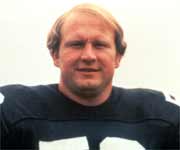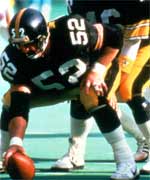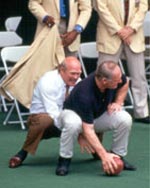Mike Webster, Class of 1997
Center Mike Webster, was a standout performer at the University of Wisconsin before embarking on a superlative 17-year career in the National Football League with the Pittsburgh Steelers and Kansas City Chiefs. However, Webster may not have played football at any level had it not been for his high school coach's willingness to play chauffeur.

As a youngster growing up on a farm in Tomahawk, Wisconsin, Mike's daily routine began with early-morning chores with his father, followed by an eighteen-mile bus ride to rural Rhinelander High School. When Rhinelander football coach Dave Lechnir attempted to recruit young Webster to the high school football team, the muscular junior declined. He informed the coach that obligations to the family farm and a dependency on the school bus for transportation would make it difficult, if not impossible, to participate in the after-school program.
Undaunted, the coach assured Webster and his father that he'd help by personally driving Mike to and from school, thus making it possible for him to do his chores and stay late for practice. Young Webster, with his father's approval, graciously accepted the offer. "If the coach hadn't been able to drive me, I guess I'd still be working for my dad," Webster related with a smile. The rest is, as they say, "history."
On July 26, 1997, Mike Webster, along with three other members of the Class of 1997 - Mike Haynes, Wellington Mara and Don Shula - became a permanent part of pro football history as an enshrinee of the Pro Football Hall of Fame.
Webster, who was born March 18, 1952, at Tomahawk, played more seasons (15) and more games (220) than any other player in Pittsburgh Steelers' history. He joined the Steelers as a part of the 1974 draft that netted Pittsburgh such future stars as Lynn Swann, Jack Lambert and John Stallworth. Not coincidentally it was also the year the Steelers won the first of four Super Bowls.
Since the All-Big Ten center stood just 6-2 and weighed a mere 225 pounds - a bantam weight by pro football standards - there was considerable doubt that he could handle opposing NFL Goliaths. However, he quickly demonstrated that he could hold his own against the game's best.
Always in top condition, Webster maintained an unswerving dedication to excellence. Through a year-round strength and weight program and a passion for health foods, he quickly bulked up to 250 pounds and eventually reached a playing weight of 260 pounds.
A quick learner, Webster played in every game during his first two seasons with the Steelers splitting time at center with veteran Ray Mansfield. Additionally, he was the long-snapper on all punts and kicks. However, in the final game of the 1975 season, Steelers' coach Chuck Noll decided to insert Webster into the starting lineup. It was the beginning of a remarkable string of 150 consecutive starts that lasted until 1986, when he missed the first four games with a dislocated elbow, an injury that might have kept a lesser man out twice as long.
Those were the only games "Iron Mike" would miss during his first 16 seasons. From his rookie season through 1985, Webster played in an amazing 177 consecutive games. As one veteran writer put it, "nothing short of an Act of Congress" would keep Webster from taking his place in the Steelers starting lineup.
"That's the toughness I like," said Mansfield. "Not a macho toughness, where you've got to strut it around, but an inner toughness, the John Wayne type who doesn't complain." The comparison to the popular actor was no accident, since Mansfield knew his former understudy was a big fan.
No
 |
In 1976, Webster showed his versatility when injuries to the Steelers' offensive line forced Noll to shuffle his
linemen. Webster started the first two games at center, the next six at guard, and the final six at center. "Mike gives us versatility," offered Steelers offensive line coach Dan Radakovich prior to the start of the 1977 season. "He's got the quickness, strength and intelligence to play center, guard or tackle. Mike was the best center in the league last year. He's the best because he has great self motivation," Radakovich proclaimed.
Like most players, Webster found life in the NFL to be a continuing education. And, like most offensive linemen, he quickly realized that fan recognition came first for mistakes. Although Mike was snapping on punts since 1974, many fans weren't even aware of his special teams role until a nationally-televised Monday night game in 1976, against the Minnesota Vikings. In that game, Steelers' punter Bobby Walden was unable to handle a high snap from Webster, resulting in a botched kick. That set up the Vikings second and clinching touchdown. Suddenly the little-noticed center was the talk of the town.
Webster even received a call from his father who suggested that his son wasn't looking through his legs at the punter before lifting his head and snapping the ball. Humbly, Webster had to acknowledge that his father's observation was on the mark. "I hadn't been looking all year," Webster recalled. "I guess I got too cocky. Rad (Radakovich) told me I was acting too much like a pro player. Now they (the fans) know who I am. I'm not just a number," the good natured Webster said with a smile.
Quickness, strength, intelligence and motivation were just a few of the weapons found in the Webster football arsenal. Intimidation was another. "Watch any other lineman in the league; they all saunter up to the line," former Steelers' assistant coach Bill Meyers once observed. "But Mike sprints to the line on every play. That's intimidating. He whipped your butt on the last play and here he comes sprinting up to do it again."
A natural leader, Webster played in 19 playoff games with the Steelers and was the team's offensive captain for nine seasons. "Webbie" was considered the strongest Steeler by most of his teammates and in the 1980 off-season he gave credence to that belief by winning the NFL's Strongman Competition.
"I always felt the best way to be able to do my best was to just get going and keep going for as long as I could," Webster said. "I had a coach tell me one time, 'You'll play much better if you just relax a little more between plays.' "Well he just doesn't understand. That guy over there on the other side of the line is trying to beat me up on every play. I'm not real calm about that. I do much better if I just keep a steady pace for as long as I can."
Webster's steady play earned him all-pro recognition six straight years from 1978 to 1983, and was named to the All-AFC team five times from 1978 through 1982. Nine times he made the Pro Bowl. That's more than any offensive lineman in NFL history. "Mike has been the thing you work around," explained Noll. "It's the one position we never had to concern ourselves with."
Although individual recognition came fast and furiously for Webster, he was the consummate "team player." "I was very, very fortunate to have been a part of a collective group of people who accomplished something that's very very rare in any profession," he once remarked in reference to the Steelers' four Super Bowl wins. "There's just no feeling like collectively doing something to be the best, and sharing that feeling with others."
Throughout his career, Webster maintained a work ethic - report early, leave late and play hurt - that earned him the respect of everyone who ever played with him. He credits his strength and conditioning as the primary reason he was able to avoid serious injury during his career. As a part of his conditioning, Mike maintained a weight room in his home and for a period of time even had a blocking sled in his front yard. "I'm not a very good athlete," he offered. "I don't run very well, and I'm not very agile or nimble. The only chance I have to be successful is if I'm in better condition than the other guy."
Mike's dedication and work ethic didn't go unnoticed. In 1985, following an early-season game with the Houston Oilers, his teammates awarded him with a game ball for his courageous play. Not only did he start that game, but he played every offensive down despite having missed the entire week of practice with an extremely painful back injury.
"Every offensive lineman wants to grow up to be Mike Webster," former Steelers' guard Mike Wolfley once said of his teammate. "But when God made him, he used a different kind of material. There will never be another one like him."
On February 1, 1988, the Steelers announced that they were leaving their long-time star unprotected under Plan B, the NFL's modified form of free agency. Twenty-three days later, Webster, the last active member of the Steelers to have played in all four Super Bowl championships, announced his retirement. Five days after that, the Kansas City Chiefs announced that they had signed Webster as an assistant line coach.
But within a few weeks the 15-year veteran realized that he still had the desire to play. Together, Chiefs' President/General Manager Carl Peterson and Coach Marty Schottenheimer, convinced "Iron Mike" to return to the field. "Playing is the best way I can contribute to this organization right now," he said in announcing the continuation of his playing career. "I still feel strongly about playing, and I believe I can contribute in a positive fashion. It will be a tremendous challenge, and that excites me."
At age 37, Webster was a little uneasy about starting over, but after six weeks in the weight room he knew he was up to the task. Along with his considerable talent, Webster bought something more to the Chiefs - experience and a winning tradition. "When opportunity comes along, you have to be ready in this business - in any business," Webster told a reporter. "There are 46 people trusting me if I'm called upon. I get a certain satisfaction knowing that I'm a dependable guy." And dependable he was. Webster was the Chiefs' starting center in 1989 and played in all 16 games.
 In the 1990 season, his seventeenth in the NFL, Webster was used more as a spot player, relieving rookie Tim Grunhard. Putting it in perspective, Grunard was six-years old when Webster began his pro career. Once again demonstrating his long-standing belief that the team success far out-weighed individual recognition, Webster accepted his new role with typical stoic dignity. "It doesn't matter to me who starts," he commented. "There are lots of ways for me to help the team. We've all got to communicate and work together and do what is best for the team."
In the 1990 season, his seventeenth in the NFL, Webster was used more as a spot player, relieving rookie Tim Grunhard. Putting it in perspective, Grunard was six-years old when Webster began his pro career. Once again demonstrating his long-standing belief that the team success far out-weighed individual recognition, Webster accepted his new role with typical stoic dignity. "It doesn't matter to me who starts," he commented. "There are lots of ways for me to help the team. We've all got to communicate and work together and do what is best for the team."
Following the 1990 season, Mike Webster officially ended his 245-game career when he again announced his planned retirement . "It's been 17 wonderful years, but one thing you learn in this game is reality," he explained. "It's time."
In 1997, at their annual meeting, the Pro Football Hall of Fame's Board of Selectors also decided that for Mike Webster, "it's time." Elected in just his second year of eligibility, Webster joins six other Pittsburgh Steeler players from the Super Bowl championship years as well as his former coach Chuck Noll and team founder Art Rooney, as a member of the Pro Football Hall of Fame.

